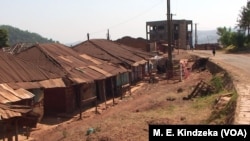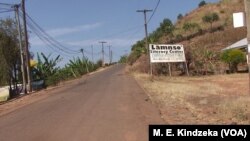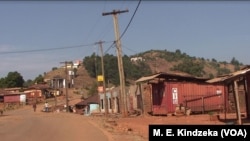Towns and villages in Cameroon's restive Anglophone regions are being deserted as battles rage between separatists and the country’s military. The fighting intensified after President Paul Biya's New Year's message in which he insisted that his military would neutralize separatists who refuse to lay down their arms.
A senior Cameroon military official, who did not wish to be named, warns in a report that visiting the mostly deserted northwestern town of Kumbo he will need military protection.
He says separatist fighters have been launching heavy attacks in the area and may be among the few people left on the streets.
On a ride through the streets of Kumbo, under military protection, it’s clear that most houses, markets and public places are abandoned while some homes and schools have been torched.
But Kumbo resident Mbiybe Tatah says that many locals are fleeing because they are afraid - not of separatists but of the military. They accuse Cameroon troops of burning their houses and shops in retaliation for failing to inform on separatist fighters hiding in their villages, he says.
"These armed military men just shoot at random and they term (call) people in Kumbo terrorists," he says.
Tatah says people began fleeing after President Paul Biya’s New Year’s speech.
Many observers had expected Biya to announce the release of some separatist leaders in a bid for peace. But, he instead repeated a vow to eliminate all those who refuse to stop fighting and lay down their weapons.
The governor of the English-speaking northwest region, Deben Tchoffo, refutes claims that the military retaliates against civilians.
But he says they cannot allow separatists to terrorize people and destroy what Cameroon has built since independence.
"The head of state is still asking those that were misdirected to lay down their weapons. If not, they will be neutralized. I am therefore launching an appeal to those of the northwest region to heed to the call of the head of state. If not, they will be neutralized."
Tchoffo says there have been many casualties since fighting intensified after Biya’s speech but he did not give figures.
Abdoul Jinguil Mussa, a crisis management expert with the Lake Chad Basin Commission, says Cameroon needs an independent body to lead peace negotiations with the separatists.
"People have died on both sides of the conflict. A lot of families have been displaced, property has been destroyed. That is why we say the best solution is when both parties have agreed that they are both losing. We need both parties to sit together in good faith, let the mediator be someone neutral, someone who is going to be there for peace to reign," Mussa said.
Cameroon’s unrest began in November 2016 when English-speaking teachers and lawyers demonstrated against the growing dominance of French in the officially bilingual country.
Separatists took over the movement and started demanding independence for the English-speaking North West and South West regions.
In October 2017, Cameroon’s separatists declared what they called the English-speaking Republic of Ambazonia and vowed no cooperation with the government in Yaounde.
Cameroon says over 1,000 people have been killed in fighting since, including 200 policemen and troops, while hundreds of thousands have fled to French-speaking regions.






